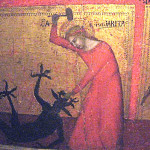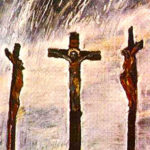We run our website the way we wished the whole internet worked: we provide high quality original content with no ads. We are funded solely by your direct support. Please consider supporting this project.

An Omni-Resourceful God
It is quite common for us to talk about the attributes of God as omnipotent (all-powerful), omniscient (all-knowing) and omni-present (present everywhere), but what about God’s unlimited resourcefulness? Consider the story of Moses’ commission in Exodus 3 and 4. Here the Lord instructs Moses to tell the elders of Israel that the Lord has heard their prayers and intends to deliver them from Egypt. (Ex 3:7-17). He assures Moses saying, “They will listen to your voice (Ex 3:18).
However, Moses does not interpret this as an infallible prediction of the future. Instead, he counters, “Suppose they do not believe me or listen to me (Ex 4:1). The Lord does not respond by assuring Moses that he knows every detail of what is going to take place before it comes about, as one might expect if he in fact possesses such knowledge. He rather shows Moses how he can turn a staff into a serpent and then back into a staff again (Ex 4:2-4). This miracle, the Lord tells him is to prove to them that the Lord sent Moses (Ex 4:5).
Moses is not convinced, though, that the first miracle will suffice. So the Lord adds a second miracle: making a hand leprous and then whole again (Ex 4:6-7). Then the Lord states, “If they will not believe you or heed the first sign, they may believe the second sign. But the Lord quickly acknowledges the possibility that even this second miracle might not convince them. He continues:
If they will not believe even these two signs or heed you, you shall take some water from the Nile and pour it on the dry ground; and the water that you shall take from the Nile will become blood on the dry ground (Ex 4:9).
If we set aside the assumption that the future is exhaustively settled, the text clearly suggests that God is not certain how many miracles it will take to convince the elders that the has sent Moses. If we rather insist that the Lord knew all along that it would take exactly three miracles, then he seems disingenuous in telling Moses they may believe after the first or the second miracle. How can the Lord tell Moses that something might happen if he knows for certain it will not happen?
This lack of certainty regarding some aspects of the future is no defect on God’s part. It’s just that the only reality that exists for God to know is that the elders may believe after one, two or perhaps three miracles. That is what is real, and so that is what God perfectly knows as real. Until the elders resolve the issue by responding to Moses’ miracles, there’s nothing other than possibilities for God to know. God can hardly be faulted for not knowing something that does not exist.
However, this passage also makes it clear that God is absolutely confident that he can convince the elders of Israel to follow Moses and escape Egypt. This much of the future is settled, for God has resolved it to be so. This episode is intended to teach Moses that God has more than enough resources to accomplish whatever he sets out to accomplish. He is an omni-resourceful God. It’s just that within the parameters of the future that God has already settled, there are unsettled features. The elders will become convinced. But it may take one, two or three miracles to bring this about.
—Adapted from Satan and the Problem of Evil, pages 109-111
Photo via Visual Hunt
Category: General
Tags: Attributes of God, Open Future, Open Theism
Topics: Defending the Open View
Related Reading

Warfare Worldview: A Basic Definition
The warfare worldview is based on the conviction that our world is engaged in a cosmic war between a myriad of agents, both human and angelic, that have aligned themselves with either God or Satan. We believe this worldview best reflects the response to evil depicted throughout the Bible. For example, Jesus unequivocally opposed evils…

What is the significance of 1 Samuel 23:9–13?
“David heard that Saul knew that he was hiding in Keliah. Saul was seeking to kill David, so David wisely consulted the Lord as to what he should do. David said, ‘O Lord, the God of Israel, your servant has heard that Saul seeks to come to Keliah, to destroy the city on my account.…

Could the God of Open Theism Have Foreknown the Crucifixion was Going to Happen? (podcast)
Greg talks about a really really really smart and good God in a really really really bad world against a not-quite-as-smart adversary. Episode 540 http://traffic.libsyn.com/askgregboyd/Episode_0540.mp3

How do you respond to Matthew 16:21?
“From that time on, Jesus began to show his disciples that he must go to Jerusalem and undergo great suffering at the hands of the elders and chief priests and scribes, and be killed, and on the third day be raised.” The ministry and death of Jesus are the centerpieces of God’s plan in world…

How do you respond to Ezekiel 26:1–21?
There are a number of specific prophecies against various cities in the Old Testament which were fulfilled (though some were not, see Jer. 18:6–10). The Lord’s prophecy against Tyre is one of the most impressive. The Lord says Nebuchadnezzar will ravage the seaport (vs. 7–11) and tear down all the buildings and throw the rubble…

Why You Have Free Will
God’s decision to create a cosmos that was capable of love and that was, therefore, populated with free agents (see previous post) was also a decision to create and govern a world he could not unilaterally control. These are two aspects of the same decision. What it means for God to give agents some degree…
